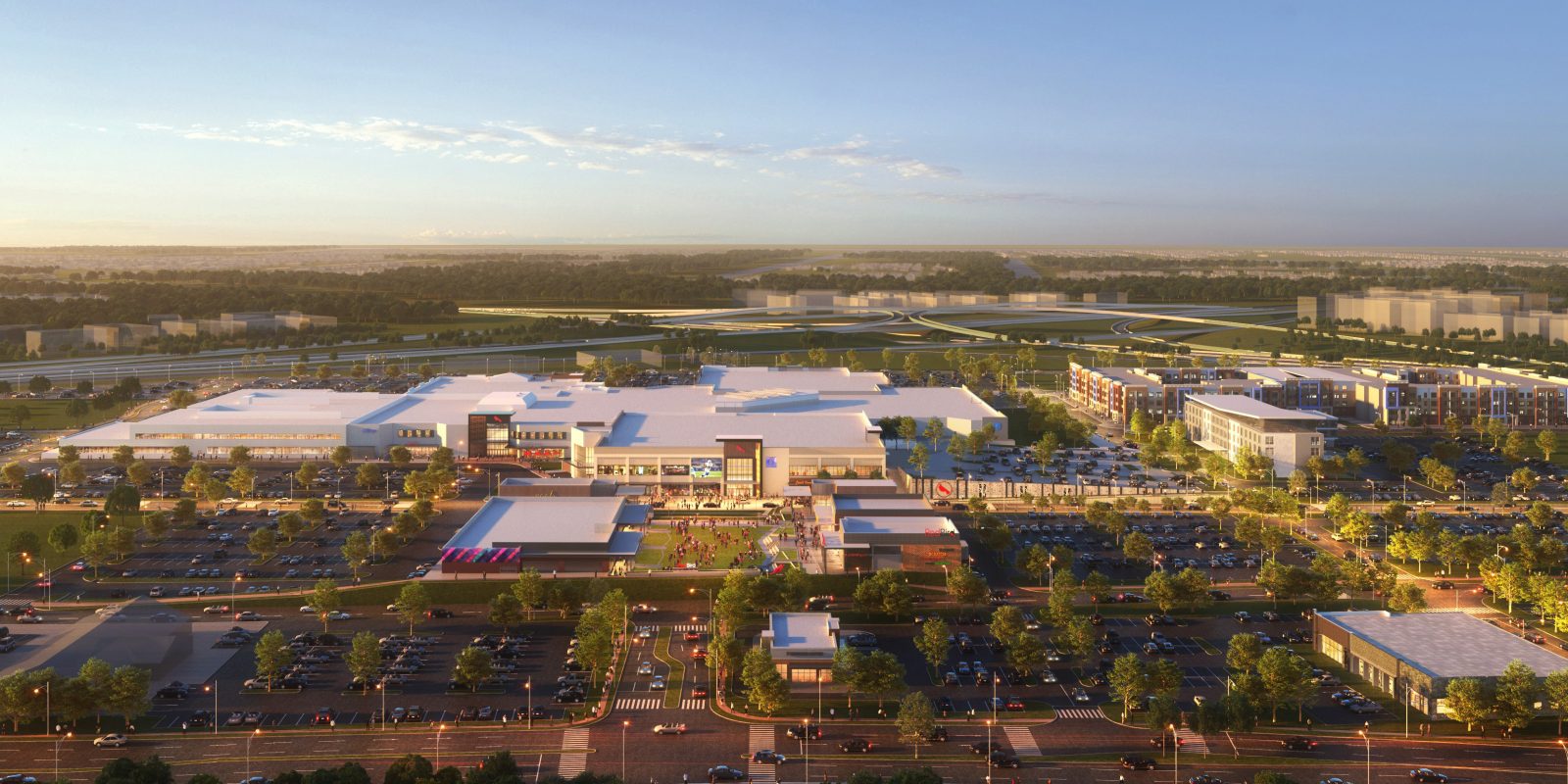
Courtesy of OmniPlan
Terrence Maiden’s RedBird Revival
The alumnus is transforming an old mall into new hope for his childhood South Dallas neighborhood.
Terrence Maiden ’00 pointed to a new stoplight on Dallas’ Camp Wisdom Road as it turned green. Behind him, nice cars stopped at the drive-thru window of a new Starbucks. In the distance, legions of cranes were helping transform what was once Red Bird Mall into an imaginative multiuse center and a more level playing field for southern Dallas.
At the center of the reconstructed Shops at RedBird are Maiden and his real estate company, Russell Glen. Among his many managerial responsibilities for the development, the TCU Football letterman is in charge of finding optimal tenants — restaurants, retailers, hospitals, customer-service companies and more — for the 21st century space.
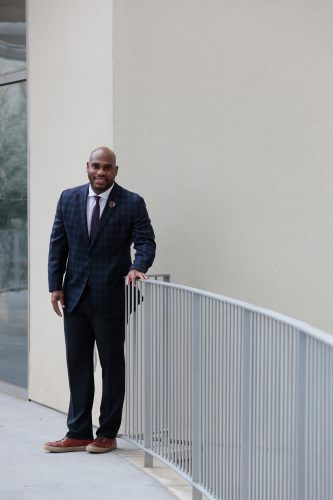
Terrence Maiden is the CEO of Russell Glen, a Dallas-based real estate development firm. Photo by Ross Hailey
His co-developer, lead investor Peter Brodsky, is making the financial moves by buying bits of the property, leftovers from a mall built for a bygone age of consumerism. New York native and Yale graduate Brodsky cut his teeth in Dallas finance by working for Tom Hicks, former owner of the Texas Rangers and Dallas Stars.
By partnering with an investor who has the interest and wealth to privately finance real estate acquisitions, Maiden has circumvented the large banks that tend to be unwilling to underwrite projects in underserved areas. Data from the National Community Reinvestment Coalition points to disparities in enabling entrepreneurship. As of 2016, only 3 percent of the Small Business Administration’s most common loan type went to Black-owned businesses.
“Where we invest our money is a reflection of our values,” Brodsky said. The national outcry that followed George Floyd’s murder in May 2020 sparked, among other things, “an acceptance of the fact that communities of color have lacked investment, and that’s not good for anyone.”
At RedBird, the two-story mosaic once installed by Macy’s is coming down so the façade will more accurately reflect the office space inside. In 2019, Chime Solutions, an Atlanta-based customer service company, moved into a 50,000-square-foot space on the mall’s second floor, bringing more than 1,000 jobs to the nearby neighborhoods.
The rest of the mall’s redesigned 900,000 square feet will retain some retail but also offer a satellite college campus and several medical facilities.
Maiden, who grew up in the mall’s shadow, dreamed up the creative use of the space and is also overseeing the design. He said he hopes RedBird will once again serve as the social and cultural center of southern Dallas. Part of his mission is to tell a more accurate story about the untapped opportunity surrounding the parking lots.
“The Red Bird area started to decline in the early ’90s largely due to some crime issues, which caused many of the grocery stores and retailers to either close or relocate farther south,” Maiden said. “Unfortunately, there remains a huge misconception about the region.
“People think that this area is widely unsafe and widely poor, and that’s just not the case,” he said. “I’m trying to change that paradigm.”
Coming Home
Oak Cliff, the larger Dallas area that includes Red Bird, might be stereotyped by outsiders, but the neighborhoods within offer nice homes for middle-class people. The demographics of Red Bird have shifted in the last two decades as many affluent Black families have decamped for DeSoto and Duncanville, Texas, both just south of Interstate 20. Hispanic Americans have moved into many of the vacated homes and now make up just over a quarter of the population in the three ZIP codes surrounding the mall. Residential real estate investors are buying housing lots and betting on a boom in the area, which is about 15 minutes south of downtown Dallas.
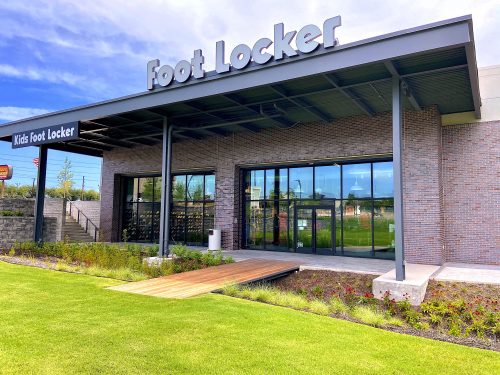
Foot Locker will anchor one side of The Shops at RedBird and indoor-outdoor restaurants on the other. Courtesy of OmiPlan
“Southern Dallas is an enormous piece of land — 208 square miles, bigger than many large American cities. It’s got 800,000 people,” Brodsky said. “There is a lot of purchasing power in southern Dallas, but there’s a supply-demand imbalance for the quality amenities.”
While the residential streets look much like those in North Dallas, the thoroughfares are often dotted with dollar stores and payday-lending operations.
Oak Cliff was once home to the Maiden family. Terrence and twin brother Tim ’00 (MLA ’02) were standout football players at David W. Carter High School in Dallas. At 15, both brothers worked at the Chuck E. Cheese facing the mall.
Terrence Maiden didn’t expect to spend so much time in his old stomping grounds, at least not in a development role that landed him on the Power Brokers of the Year list in D CEO Magazine in 2019.
After graduating from TCU with a degree in psychology, he considered how to build a life in teaching or perhaps banking. A surprise job opportunity in commercial real estate provided by another TCU Football letterman, Dale Ladner ’74, opened a door for learning the basics.
Back then, Maiden said, “I didn’t know that commercial real estate was a career option.”
He was a quick study, soon moving to roles at Panda Express and then Panera Bread, where he was director of real estate. By traveling the southern United States in search of prime locations for chain restaurants, he saw firsthand how consumers were abandoning centralized gathering places in favor of neighborhood convenience.
To succeed in the property game, “you don’t have to hold a degree in finance,” said Leslie Purvis ’97 (MBA ’15), associate director of TCU’s Center for Real Estate. “It’s so much about an individual’s personal brand and personal reputation.”
Maiden seemed to intuitively understand the field’s secrets to success. He leveraged corporate real estate gigs to expand his list of contacts and prove that he could build nexuses between people and the goods and services they wanted, where they wanted them.
A job as executive vice president of development for Corinth Properties brought Maiden back to southern Dallas, where public and private investment was starting to trickle in. He struck out on his own by founding Russell Glen — named after the Oak Cliff street he grew up on — just in time to partner with Brodsky and take advantage of the City of Dallas’ ambitious GrowSouth development plan.
“We’re getting to that critical point where we’re starting to see more momentum come this way,” Maiden said, “but it’s been a journey.”
A People Project
When Maiden and Brodsky jumped into The Shops at RedBird plans, they conducted at least 50 meetings with the community — groups organized by Dallas City Council members or area churches. “I like to get involved with the community and let the community drive what we do,” Maiden said, “not assume that what I think is best is the best thing.”
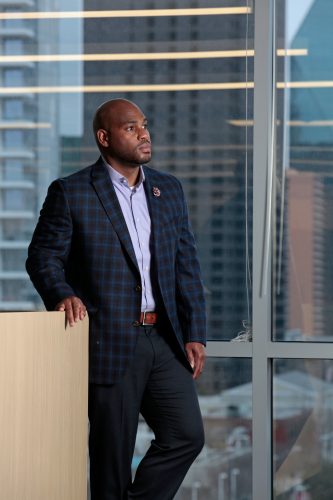
Terrence Maiden sought community input for his redevelopment of Red Bird Mall. Photo by Ross Hailey
For one, the neighbors said the name needed to change back to Red Bird. In 1997, a California investment group bought the space and renamed it Southwest Center Mall. The title sent a sign of unwelcome, Maiden said, because the name Red Bird had always symbolized “a place where the community felt that they could go and call their own.”
For two, he learned, they wanted to keep it their own. People from northern Dallas didn’t need to move into the neighborhood for the concept to be financially viable. “One of the big things that we’ve been getting, as you can imagine,” Maiden said, “is a fear of gentrification.”
Brodksy said that his plan is predicated on people already in southern Dallas staying put. “We are trying to provide quality amenities to the people who already live there.”
Community requests for the mall space were simple: expanded job opportunities, an entrepreneurship center, walking trails, quality housing and family activities from jazz concerts to yoga classes.
Direction in mind, the project officially started in 2015 with acquisitions of the main mall, Dillard’s and the land where J.C. Penney had stood.
The centerpiece of the concept is the Lawn at RedBird, a grassy area on the north side of the development. Foot Locker has opened a new store on one side; on the other will be indoor-outdoor restaurants ideal for safe gathering in whatever the post-Covid normal will look like.
Dallas chef Fitzgerald Dodd plans to open a restaurant concept called Grits Southern Bistro in early 2022. The time is right for the area and for his West African-inspired, elevated Southern cuisine, he said. “There are more people moving to the southern sector. … You have a good, diverse mix of people of multiple races and multiple socioeconomic statures. We want to fit right into that middle class and invite all those people to our table.”
Chime Solutions, too, is focused on the community. It offers not only employment opportunities for people who might otherwise have to seek work in North Dallas, but also resources such as day care and homebuying tutorials. CEO Mark Wilson said that his company’s mission, like Terrence Maiden’s, is in service of the surrounding communities. “It’s just underinvestment that causes what most people see as blight.”
Wilson called both Chime and RedBird “a shining example. If you do make the investment, it can be a good outcome for everybody: customers, their customers, the folks that work for us, their families. The multiplier effect is in full effect when that initial investment is made.”
The UT Southwestern and Parkland health systems are opening outpatient clinics so Oak Cliff residents will no longer need to trek to northern Dallas for routine health care.
And Jarvis Christian College has opened a satellite campus across from Chime.
With an anticipated 2,000-plus employees, along with students and health care patients, there will be plenty of visitors to the stores and food court that will form the center of what was once solely a shopping destination.
A Mall of the Future
What will Maiden’s big vision look like in reality, once the final food court spots and consumer goods retailers open their doors? It’s hard to say, he said. “I don’t have a crystal ball to see how the communities are going to respond long term to the incredible investment of time, effort and capital put into this redevelopment.”
“What I liked and what intrigued me the most is that there weren’t people that looked like me in this business.”
Terrence Maiden
How well the demographic groups intermingle might ultimately determine the project’s success. Plenty of people live in subsidized housing near the mall, but across the highway in DeSoto, people are living in large, nice houses and on golf courses. For a bustling food, health and commerce hub to manifest, the entire neighborhood will need to agree on the mall’s suitability as a community center, Maiden said.
But after years in real estate development, Maiden has learned to make strategic bets. He has also realized that he can play a unique and influential role. “What I liked and what intrigued me the most is that there weren’t people that looked like me in this business.”
In 2017, the Bella Research Group and the Knight Foundation reported that only about 1 percent of senior executive roles in the real estate industry belonged to Black men, with women of color represented even less.
The reality and opportunity reflected back to a neighborhood from the physical structures within it can shape identities, Maiden said. “I was just fascinated with what you can do through real estate. I do feel like there is an obligation for me to leverage my experience in relationships to see what sort of change I can make.”
Malls have long been a driver of culture and change. When Maiden was a teenager in the 1990s, he could go to Red Bird to assess the transient notions of cool: what the artsy kids were listening to at the record store or who was wearing what brands.
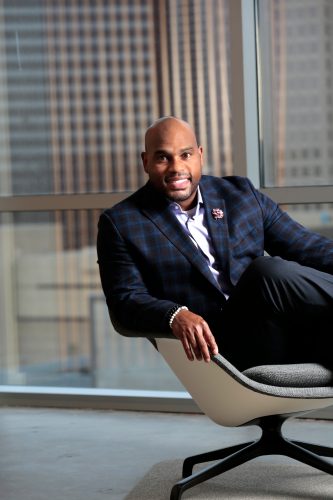
Terrence Maiden grew up in South Dallas and is passionate about bringing new opportunity to this often-overlooked area. Photo by Ross Hailey
And in the 21st century, steps toward racial and economic justice are not just cool but also urgent priorities. By bringing jobs and providing spaces to connect customers with minority-owned businesses, Maiden is helping to level the playing field in Dallas.
If RedBird is a success story, the sky is the limit for what he might do for other empty American shopping centers, said TCU’s Purvis, who estimated that around 600 struggling malls across the country need a redesign. “The number of underperforming malls is increasing on a monthly basis at an astronomical rate.”
The time couldn’t be more right, Brodsky said. “I don’t think commercial real estate is going to solve every societal problem — far from it. But I also don’t think that philanthropy alone is going to solve every societal problem. Most societal problems stem from the fact that there is a lack of work and ability to earn. And by bringing development to a community, you’re creating more opportunities for people to work and earn close to their homes.”
Which is exactly what people in southern Dallas are requesting, Maiden said. “I think a lot of the outcry that we see from communities of color is perceived as anger, but actually it’s a voice that comes from many years of suffering or just trying to survive. Despair is a real feeling that these communities feel, and they are looking for a sign of hope. Real estate is a powerful tool that could be leveraged to provide not only equality, but also meaningful change in people’s quality of life.”

Your comments are welcome
15 Comments
Excellent story on a magnificent effort and opportunity for the residents of south Dallas.
Hats off to Maiden and Brodsky, their example of commitment to a higher cause through business investment is a model that can and should be duplicated throughout our country.
God bless them!!
An absolutely essential undertaking!! Kudos to Terrence & Brodsky!! What a special way to apply that “ Psychology “ background to real -world needs!! I’m keeping them in my thoughts & prayers for every success!!
So proud of you and I pray for even more success.
This endeavor is a great model for what’s needed across this country. I am hopeful for their success and pray they carry their concept to other locations that could benefit so many.
Way to go! I will have to drop by one of these days.
You have an amazing vision. Best of luck in your endeavors. The African Americans need more professional leaders like yourself.. The sky is the limit for you.
Best Wishes,
Zina
zbc1957@gmail.com
Thank you so very much for what you are doing to restore pride back to the Southern area. I was in the area last week. I can’t wait to spend my weekends at “Redbird” again! Continued success! And “thank you” so much! God Bless you! searcy_lola@yahoo.com.
You had me at Oak Cliff native and TCU graduate. Well done, thou good and faithful servant. Well done. I’m an Oak Cliff native too currently living in DeSoto. One of my sons and his wife are TCU graduates. I wish for you nothing but the best.
You had me at Oak Cliff native (me too) and TCU graduate (one of my sons and his wife too). Well done thou good and faithful servant. Well. Done. We will avail ourselves of many of the opportunities to come. In fact, I’m kinda looking for a new pair of TCU related shoes … …
So proud of you Terrence. You are an awesome brother and a true testiment, that something great can come out of South Dallas. May you continue to thrive and do great exploits in the Southern Sector. Bless you and greater things are in store.
Terrence, I am beyond proud of you and your brother Tim. You have elevated the commercial real estate development industry to the next level, especially for young men of color. Continue to be the light God has created you to be. Peace and Blessings.
Karen Riley
This story is truly inspiring. It is also of special significance to me as the area that became Redbird Mall used to be where me and my best buddy used to hunt for small game when we were young.
In using the great gifts that God has given you, Terrence and Peter, for the betterment of fellow neighbors in a challenged area, this project has phenomenal potential to help the local residents, the neighborhoods, and the region, as well as to serve as an example for many other such local regions in the country.
I’m deeply inspired by this revelation. May God continue to open doors for hi continued success.
Related reading:
Where Academic Teams Shine Together
We’re home to extraordinary academics working to make the greater good even greater.
Alumni
Maiden Brothers’ Community-Based Programs Nurture Potential in Dallas Youths
Education can lead to limitless possibilities, they say.
Alumni, Features
HGTV’s Clint Robertson Builds an Empire
The Boise Boy and jack-of-all-trades is no stranger to TV or starting from scratch.